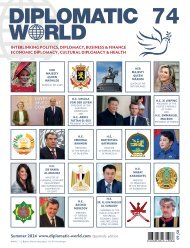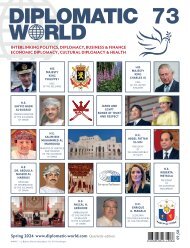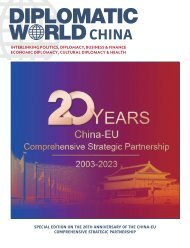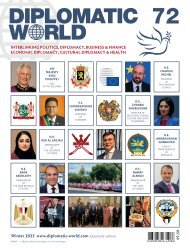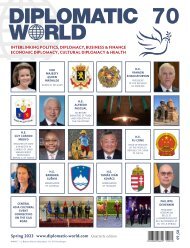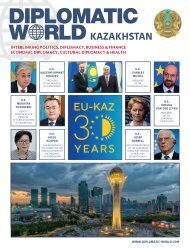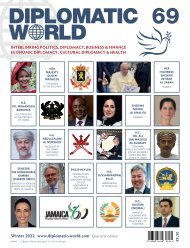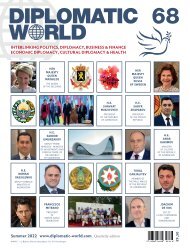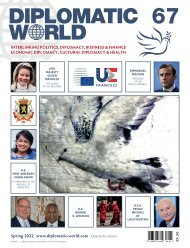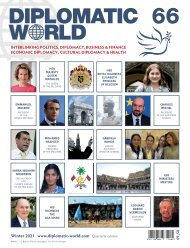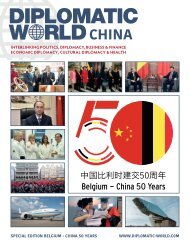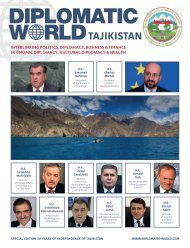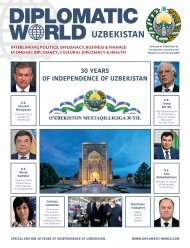Diplomatic World 67
Create successful ePaper yourself
Turn your PDF publications into a flip-book with our unique Google optimized e-Paper software.
H.E. FÉLIX ULLOA<br />
VICE-PRESIDENT OF EL SALVADOR<br />
RECENTLY, EL SALVADOR HAS ATTRACTED MUCH<br />
INTERNATIONAL ATTENTION BY TAKING A VERY<br />
INNOVATIVE STEP – THAT IS MAKING BITCOIN<br />
A LEGAL CURRENCY. CAN YOU TELL US MORE<br />
ABOUT THE REASONS BEHIND THIS DECISION<br />
AND ABOUT ITS IMPACT SO FAR? IN WHAT WAY<br />
WILL IT CONTRIBUTE TO THE COUNTRY’S<br />
ECONOMIC DEVELOPMENT?<br />
As a matter of fact, it was during an international conference in<br />
Florida (the Bitcoin conference in Wynwood, held in June 2021)<br />
that President Bukele announced his willingness to adopt the<br />
Bitcoin as a legal currency in El Salvador.<br />
After this, President started working with experts in a way that<br />
made the country ready to adopt Bitcoin, which is one among<br />
many cryptocurrencies. In doing so, President Bukele prepared<br />
the legal framework in order to adopt legally the Bitcoin, which<br />
was enacted on September 7, 2021 by Congress.<br />
But before that, he had announced how the situation would be<br />
managed. There were some pilot experiments in touristic spots<br />
where tourists could use Bitcoin as a legal tender. An international<br />
surf championship was held in May that allows to bring surfers<br />
(male and female) from 52 countries around the world. Most of<br />
them were using bitcoin in that specific area. The ATM machines<br />
were Bitcoin-ready.<br />
And this experience was the pilot programme to extend it all<br />
over the country afterwards. Now we have these Bitcoin-ATM<br />
machines across the country and in our consulates in the United<br />
States. Our President wanted to encourage our diaspora to use<br />
them, because they represent a faster and more secure system<br />
to send remittances to their families in El Salvador; in addition to<br />
the fact that they get rid of expensive commissions.<br />
Of course some companies like Western Union were upset;<br />
Western Union makes USD 400 million per year in the fees they<br />
charge to the people who use their services to send money.<br />
There were doubts of course. Some voices were worried the<br />
adoption of Bitcoin could be used for money laundering, and<br />
there were similar “urban legends”. We have been working hard<br />
to diminish the fears of the population.<br />
When the law was enacted and all the ATM machines were in<br />
place, President Bukele attracted users by giving everyone who<br />
signed up for the government’s app a USD 30 bonus in Bitcoin.<br />
Furthermore, 4,000 young people were trained to travel across<br />
the country and help elderly people or those living in rural areas.<br />
Today, there are more than 3 million Salvadoreans with Bitcoin<br />
accounts (more than double than the number of users with traditional<br />
bank accounts).<br />
Now you can go to the supermarket, the drug-store, to the gas<br />
station, and pay with bitcoin. We have inaugurated a new airline<br />
H.E. Félix Ulloa Vice-President of El Salvador<br />
(Volaris) which also accepts bitcoin payments. We can see that<br />
Bitcoin is becoming part of a normal life and widely accepted by<br />
everybody.<br />
We are seen as a model worldwide. People from all over the<br />
world have expressed an interest in coming to El Salvador to<br />
study our experience.<br />
For those who were so sceptical, today we realise that Bitcoin is<br />
skyrocketing. We first bought 400 bitcoins – worth an estimated<br />
USD 21 million at the time of purchase – then another 300.<br />
In the end, our final goal is none other than to improve economic<br />
processes, facilitate the way to do conduct business and raise<br />
the living standards of the population.<br />
EL SALVADOR IS PAYING GREAT ATTENTION TO<br />
THE 2030 SUSTAINABLE DEVELOPMENT AGEN-<br />
DA, HAVING RECENTLY CREATED THE NATIONAL<br />
COUNCIL FOR SUSTAINABLE DEVELOPMENT<br />
(CONSEJO NACIONAL DE DESARROLLO SOSTENI-<br />
BLE). HOW IS EL SALVADOR INCORPORATING AND<br />
MAINSTREAMING THE 2030 SUSTAINABLE DEVEL-<br />
OPMENT GOALS INTO ITS NATIONAL STRATEGIES<br />
AND POLICIES? IS EL SALVADOR ON TRACK OF<br />
MEETING THESE GOALS?<br />
I am the Chairman of the Board of the National Council for<br />
Sustainable Development, which is in charge of tracking the<br />
17 SDGs.<br />
H.E. Félix Ulloa Vice-President of El Salvador<br />
For instance, let us consider SDG 2: Zero Hunger. We are reviewing<br />
our agricultural policy. Because in the past, the previous<br />
government abandoned all activities in rural areas.<br />
Now we are going back to develop the coffee plantations, for<br />
example. In May, we approved with the new national assembly<br />
a trust fund for USD 1.2 billion – 50 percent of that fund will<br />
be used to recover 50,000 acres of coffee which will allow<br />
El Salvador to be a big exporter. In the past, we were one of<br />
the top five exporters worldwide – this was before the Civil War.<br />
16 17




